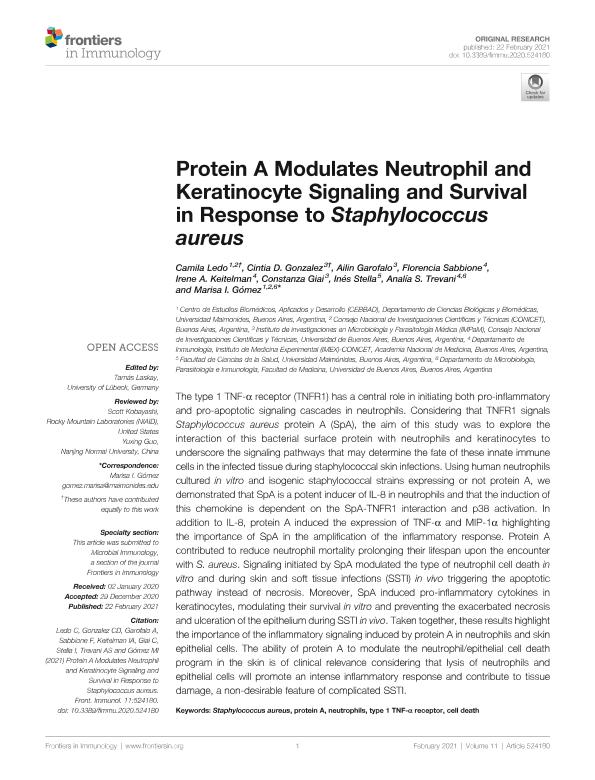Artículo
Protein A Modulates Neutrophil and Keratinocyte Signaling and Survival in Response to Staphylococcus aureus
Ledo, Camila ; Gonzalez, Cintia; Garofalo, Ailin Natalia
; Gonzalez, Cintia; Garofalo, Ailin Natalia ; Sabbione, Florencia
; Sabbione, Florencia ; Keitelman, Irene Angélica
; Keitelman, Irene Angélica ; Giai, Constanza
; Giai, Constanza ; Stella, Inés Yolanda; Trevani, Analía Silvina
; Stella, Inés Yolanda; Trevani, Analía Silvina ; Gomez, Marisa Ines
; Gomez, Marisa Ines
 ; Gonzalez, Cintia; Garofalo, Ailin Natalia
; Gonzalez, Cintia; Garofalo, Ailin Natalia ; Sabbione, Florencia
; Sabbione, Florencia ; Keitelman, Irene Angélica
; Keitelman, Irene Angélica ; Giai, Constanza
; Giai, Constanza ; Stella, Inés Yolanda; Trevani, Analía Silvina
; Stella, Inés Yolanda; Trevani, Analía Silvina ; Gomez, Marisa Ines
; Gomez, Marisa Ines
Fecha de publicación:
02/2021
Editorial:
Frontiers Media
Revista:
Frontiers in Immunology
ISSN:
1664-3224
Idioma:
Inglés
Tipo de recurso:
Artículo publicado
Clasificación temática:
Resumen
The type 1 TNF-α receptor (TNFR1) has a central role in initiating both pro-inflammatory and pro-apoptotic signaling cascades in neutrophils. Considering that TNFR1 signals Staphylococcus aureus protein A (SpA), the aim of this study was to explore the interaction of this bacterial surface protein with neutrophils and keratinocytes to underscore the signaling pathways that may determine the fate of these innate immune cells in the infected tissue during staphylococcal skin infections. Using human neutrophils cultured in vitro and isogenic staphylococcal strains expressing or not protein A, we demonstrated that SpA is a potent inducer of IL-8 in neutrophils and that the induction of this chemokine is dependent on the SpA-TNFR1 interaction and p38 activation. In addition to IL-8, protein A induced the expression of TNF-α and MIP-1α highlighting the importance of SpA in the amplification of the inflammatory response. Protein A contributed to reduce neutrophil mortality prolonging their lifespan upon the encounter with S. aureus. Signaling initiated by SpA modulated the type of neutrophil cell death in vitro and during skin and soft tissue infections (SSTI) in vivo triggering the apoptotic pathway instead of necrosis. Moreover, SpA induced pro-inflammatory cytokines in keratinocytes, modulating their survival in vitro and preventing the exacerbated necrosis and ulceration of the epithelium during SSTI in vivo. Taken together, these results highlight the importance of the inflammatory signaling induced by protein A in neutrophils and skin epithelial cells. The ability of protein A to modulate the neutrophil/epithelial cell death program in the skin is of clinical relevance considering that lysis of neutrophils and epithelial cells will promote an intense inflammatory response and contribute to tissue damage, a non-desirable feature of complicated SSTI.
Palabras clave:
CELL DEATH
,
NEUTROPHILS
,
PROTEIN A
,
STAPHYLOCOCCUS AUREUS
,
TYPE 1 TNF-Α RECEPTOR
Archivos asociados
Licencia
Identificadores
Colecciones
Articulos(IMEX)
Articulos de INST.DE MEDICINA EXPERIMENTAL
Articulos de INST.DE MEDICINA EXPERIMENTAL
Articulos(IMPAM)
Articulos de INSTITUTO DE INVESTIGACIONES EN MICROBIOLOGIA Y PARASITOLOGIA MEDICA
Articulos de INSTITUTO DE INVESTIGACIONES EN MICROBIOLOGIA Y PARASITOLOGIA MEDICA
Citación
Ledo, Camila; Gonzalez, Cintia; Garofalo, Ailin Natalia; Sabbione, Florencia; Keitelman, Irene Angélica; et al.; Protein A Modulates Neutrophil and Keratinocyte Signaling and Survival in Response to Staphylococcus aureus; Frontiers Media; Frontiers in Immunology; 11; 2-2021; 1-15
Compartir
Altmétricas



